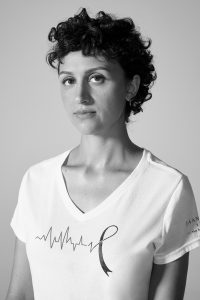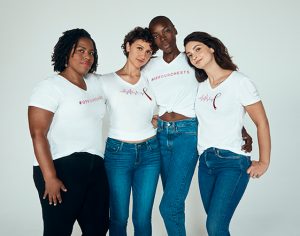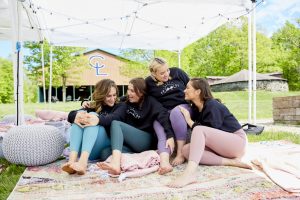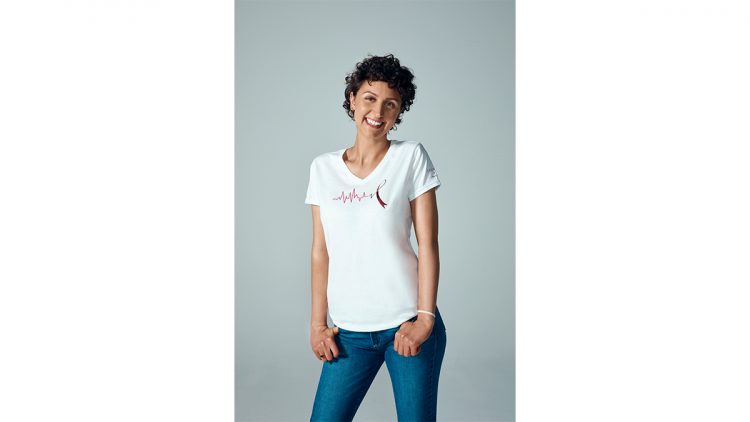Laila R. was diagnosed with stage 2 triple positive invasive ductal carcinoma when she was 28. She has conquered 3 surgeries, 6 rounds of chemo, and 25 rounds of radiation. She’s been in remission for 6 months. She’s super passionate about sharing the realities of breast cancer, which is rarely pretty or pink. Being diagnosed at a young age has turned her into a firm believer in self-advocacy in the doctor’s office. She also has dedicated her career to finding a cure through cancer research.
We had the chance to talk with Laila. We are honored to share her words of wisdom.
On Being a Scientist:
When I was younger, I did well in Math and Science and everyone said I should go to medical school to become a doctor. I always thought it sounded pretty interesting so I started college as a pre med Biochem major. At the time, I was working in patient escort at a hospital and one day the engineers who designed the da Vinci Surgical Robot were in the lobby. I talked to them and asked them questions about it. [It’s a device that has made prostate cancer more minimally invasive.] By the end of that conversation I was asking, ‘What is your profession? What do you do?’ because it was at that point I knew for the first time in my life what I wanted to do. I want to advance medicine.
I didn’t want to tell patients there weren’t options for them. (That’s one reason why I didn’t want to be an MD.) Research has been a really neat avenue for me where I have been able to advance medicine and science and still be in the medical profession to get after that passion as well, all while helping people.
On Science:
I like being in the lab. It’s rewarding to lead a team and do the strategy development work, but nothing beats putting your gloves on, getting in the lab, and performing an experiment.
On the Reality of Television:
The worst portrayal of science on television is that you always see these colored liquids in beakers, and that’s the magic of science. In reality, it’s rarely colored liquids in beakers.
I’m a young woman in science. That’s not at all a character that’s portrayed on television. I often shock people when I tell them that I’m a scientist. They often tell me they’ve never met a real live scientist, that they would never expect that to be my profession, or that any women are even in science.
I’m a young woman in science. That’s not at all a character that’s portrayed on television.
On Motivation:
I love the potential impact that we can make [as scientists]. Science is not all fun. There are a lot of days when your experiment fails or things just don’t make sense. This is especially true in biology because we can’t control biology, and we know so little. We’re slowly chipping away at it but there’s a lot of room for failure. I stay motivated by thinking about the broader impact of the work that we are doing. As soon as I think about that, I am re-inspired to keep going.
 On Diagnosis:
On Diagnosis:
The diagnosis was right after my 28th birthday. Diagnosis was a challenging experience. My lump was discovered by my gynecologist at my annual gynecology exam (yes, I go every year and I think everyone should.) My gynecologist found the mass and my first thought was breast cancer. She sent me for an ultrasound. The ultrasound technician barely looked at it. She took a couple pictures and told me it was nothing. That the radiologist would sign off on it and I’d be on my way. Being the inquisitive person that I am, I felt that the exam wasn’t very thorough. I kept thinking, If I have a mass I can feel, there must be an imaging modality that can pick up this mass.
When she came back in the room I started asking lots of questions, ‘Can we do a mammogram? Can we do a biopsy?’ and she kept saying no. She looked at me point blank and said, ‘We can’t biopsy something that’s not there.’
I walked away from that appointment discouraged and confused. I didn’t feel comfortable with that interaction. My gynecologist confirmed that it was nothing. She said we were already taking precautions by imaging the lump. She reassured me repeatedly, ‘You have nothing to worry about.’
I spent the weekend researching where I could go for imaging. It was a Friday when I got my ultrasound, and first thing Monday morning I called several different facilities and tried to convince them they needed to allow me to get a mammogram. I was successful and when I went in for a mammogram, they were super thorough. And at the end of the day the radiologist herself performed a biopsy and told me it was highly suspicious.
It’s a bit terrifying to think that I could still be walking around with the cancer inside me. My outcome would be a lot worse.
She looked at me point blank and said, ‘We can’t biopsy something that’s not there.’
On Knowing Cancer Personally & Professionally:
A lot of people ask me what was it like to get diagnosed and be so familiar with the disease and I often describe it as a blessing and a curse. It was my language, nothing was foreign to me. I knew the treatments I’d be getting. I knew the general trajectory of the journey.
That was great because it wasn’t totally foreign, but I feel like at the same time I was diving deep. I read every study published in the last twenty years. Looked through all of the options to decide on the best treatment option for myself. I really wanted to be an active part of the treatment team, which probably drove my oncologist totally crazy, to be honest!
I really wanted to be an active part of the treatment team, which probably drove my oncologist totally crazy, to be honest!
On Self-Advocacy:
After being diagnosed, I was all about getting second opinions. I made sure that I became super comfortable with each person I was choosing to treat me. I became really passionate about advocating for myself and guiding others to advocate for themselves. It’s so important to make sure what you’re being told makes sense to you. Ask more questions. Dig deeper.
I became really passionate about advocating for myself and guiding others to advocate for themselves.
On Life After Cancer:
Cancer fundamentally changes you. There is a lot of ongoing work. We get diagnosed, we go into fight mode where we have to take certain steps to survive – and there is some comfort in that. That you are in treatment, and actively fighting it, and doing everything you can. And when you’re done it’s like, ‘Okay you’re free now.’ But in reality, you’re left with endless worry about recurrence and you don’t have that same comfort that you had when you were in the treatment phase.
I was so fortunate to have a community that rallied behind me. To have a support system that was made up of my colleagues at work, friends and family. They made me meals and sent me letters, but it stopped when treatment stopped. That can be hard because cancer doesn’t just end. You’re still dealing with a lot of cancer-related things in your life. People just assume you’re done, that life is good, and you’re ready to move on.
Overall, in spite of the struggles, I am super pumped to be done the treatment phase. Cancer has made me a lot more reflective in terms of thinking about where I’m at, how I’m spending my time, and what I want to do with my life. It’s been a time of reinvention of myself.
 On The Breasties:
On The Breasties:
I came across The Breasties via Instagram. I think that’s how a lot of us found them and I am so grateful I did! Once I had gotten past the anger of getting diagnosed, I wanted community. I needed it, so I started searching hashtags about breast cancer and sure enough I started seeing all of these bold, beautiful, bald women embracing their diagnosis and their cancer. And through some of those images, I stumbled across the page of The Breasties.
I started messaging with other women in their organization to see what it was all about. The Breasties held a contest last year for their gala. To win the contest you had to describe how you move mountains. The winner goes to the gala .
I watched the submissions for a few weeks, unsure if I wanted to enter, and when it was the last day for me to submit anything, I think I had an hour left, and I quickly wrote something and just went for it and posted it. Sure enough, I got to go, which was awesome. Just getting to meet all of these women in person that I had been talking to online and being with all of these other young women who were going through similar things… You immediately connect with them. There is no worry about uncomfortable questions. We’re all going through this together. We all get it. That’s the key; feeling understood with no need to explain yourself. It’s a really great support system and community.

Visit here to wear your support for Laila and The Breasties. 20% of the proceeds will be donated to support their mission.



Thanks for sharing this blog. This is really a nice blog. i have enjoyed reading it. keep sharing…